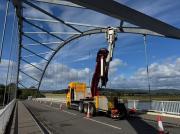Council response to reform of police and fire services in Scotland
9th September 2011
The Highland Council is to constructively engage with the Scottish Government as a matter of urgency to ensure that a single police service and a single fire service in Scotland reflects the distinctive needs of the Highlands.
Councillors are eager to protect staffing levels in local communities. They will actively consult on the specifics and not just the general principles of national policing and fire models; highlight the concerns and vulnerabilities that exist in the shift towards a single police and a single fire service; and underpin the importance of local accountability and decision-making.
The Council has agreed to liaise with other local councils in the Islands to prepare a detailed submission to the Scottish Government.
Councillor Michael Foxley, Leader of the Council Administration, said: "We would have preferred the Scottish Government to have chosen a regional model for the future delivery or police and fire services. However, we must move on and engage with the Government to ensure we secure the best deal for Highland communities.
"We are very proud of our police and fire force in the Highlands and recognise the service they provide in keeping our local communities safe. There are serious issues and serious concerns about retaining the current level of local service and accountability into the future. We must avoid the serious problems the Highlands experience as the result of the centralised ambulance service. We must work together to ensure we retain an effective police and fire service in the Highlands."
He said it would be essential to have an appropriately ranked officer for Highland, who had the necessary experience and was able to make decisions and provide the necessary strategic leadership, with delegated authority without referring back to force headquarters.
A report, considered by the Council, highlighted some of the issues, which included:-
* Maintenance of police/fire numbers, distribution and budget in Highland and protection against the drift of resources to other areas;
* Maintenance of access to local and specialist services;
* Maintenance of response approach to crime and other incidents;
* Issues of career progression within a single force, to ensure that that rural and remote areas do not lose out on the best staff;
* Understanding of policing and community safety in rural and remote areas - urban issues must not be allowed to dominate;
* Issues of aligning our local partnership working culture with a new single police force driven by national rather than local concerns;
* Continued opportunities for regional shared services - such as delivery of local HR and finance support and joint asset management.
Related Businesses
Related Articles
Exciting Career Opportunities With The Highland Council Now Open For Applications
# 10 December 2025 Career opportunities with The Highland Council The Highland Council is looking to fill a variety of posts relating to civil engineering and flood risk management based in locations across the area. Included are opportunities specifically for civil engineering graduates and technicians, providing the ideal job with career progression for anyone recently qualified and ready for a varied and interesting role.
What the NC500 Research Projects Are Designed to Do - and Why They Matter for the Highlands
As the North Coast 500 approaches its tenth anniversary, it has become one of Scotland's most well-known tourism success stories. The 516-mile loop around the far north of the Highlands has been celebrated internationally, marketed as a world-class road trip, and credited with transforming visitor numbers in some of Scotland’s most remote areas.Help Shape the Future of Thurso
The Highland Council is inviting people that live, work, or study in Thurso, to come along to the public consultation events to have their say. This is an opportunity to help shape the future of Thurso, to gather views and ideas.
Are Scottish Councils Quietly Reversing Outsourcing? A Look at Insourcing, Cuts and the Highland IT Shift
A notable article in the Guardian on 6 December 2025 noted the high sums being paid by London councils outsourcing services to private firms. The article starts with the reduction in council funding by UK government since 2010.Council welcomes Visitor Levy flexibility plan
The Highland Council welcomes moves by the Scottish Government to introduce greater flexibility on how it could design a Visitor Levy Scheme for consultation. The Visitor Levy (Scotland) Act 2024 currently provides local authorities with discretionary powers to implement percentage-based levies following statutory consultation.Highland Council is reaching out for views to shape its next 26/27 budget.
As it looks to set out its forthcoming priorities, the council is seeking involvement from members of the public, including businesses, community groups, parents, and young people. All their opinions are going to be crucial in deciding how Highland Council will take on its budget challenge for 2026-2027.Have your say in Thurso's future £100million investment by attending public consultation events
Thurso is to benefit from £100m investment in education and community facilities and are rolling out the first phase of public consultations on 9 and 10 December 2025. The Highland Council is inviting people that live, work, or study in Thurso, to come along to the public consultation events to have their say; this is an opportunity to help shape the future of Thurso, to gather views and ideas.Finding new owners for empty homes - Scheme launched to help return more empty homes to active use
A new online portal has been launched to bring empty homeowners together with prospective buyers or developers with the aim of facilitating more properties to be used as homes again. Covering the whole of Scotland, this builds on the success of local pilots, referred to as "matchmaker schemes".Consideration for short term let control area in Skye and Raasay
Steps towards introducing a short term let control area have been considered by Highland Council's Isle of Skye and Raasay area committee. On Monday (1 December 2025) the committee heard evidence to justify the grounds for the introduction of a Short Term Let Control Area covering all or part of Skye and Raasay.Workforce North event spotlights Highland economy
EMPLOYERS and educators from across the Highlands have gathered to hear how a new initiative is aiming to transform the region's economy. Workforce North - A Call to Action brought together business leaders and teachers from primary and secondary schools from across the Highland Council area with a wide range of partners geared towards education, learning and skills development at Strathpeffer Pavillion.
